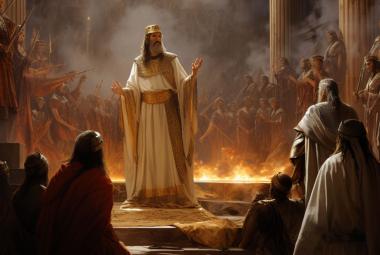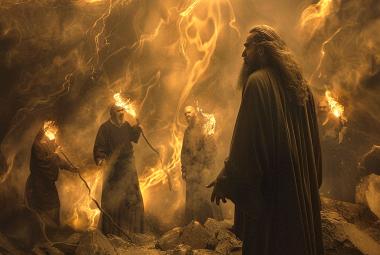Q: A question about Good Friday:
"How can there be three days and three nights between Friday and Sunday?"
The observances of Good Friday and Easter Sunday have perpetuated the traditional chronology that the crucifixion took place on a Friday, that the Lord's body was buried on that day about 6 p.m., and that he rose from the dead early on Sunday. There are some, however, that feel this tradition is at odds with the Scriptural record. It also seems to conflict with certain prophetic and legal facts.
Three Days
The first problem is reckoning "three days" between Friday evening and Sunday morning. I once co-hosted a TV show which had the famed apologist John Warwick Montgomery as a guest. This issue came up and John rendered the traditional rationalization, pointing out that the Jews reckoned a partial day as a whole day.
I turned to my co-host and explained, "You must remember that John is an attorney, and that's the way they bill." (John almost fell out his chair laughing; he didn't realize that I was aware of his distinguished legal background.) But the difficulty remains. Our Lord's definitive statement is one of the problems:
"For as Jonah was three days and three nights in the whale's belly; so shall the Son of man be three days and three nights in the heart of the earth." Matthew 12:40
The mention of nights as well as days makes it hard to render this as simply an idiom rather than a statement of fact. Further, when Paul declares the resurrection of Christ to be "according to the Scriptures" in 1 Corinthians 15:4, it is difficult to conclude that he wasn't citing Jonah 1:17. Intensifying the issue, the "three days" was a principal issue at the trial of Jesus.
"Now the chief priests, and elders, and all the council, sought false witness against Jesus... At the last came two false witnesses, And said, This [fellow] said, I am able to destroy the temple of God, and to build it in three days." Matthew 26:59-61
What did Jesus really say? "Destroy this temple, and in three days I will raise it up", John 2:19. The same phrase reoccurs in the gospels a dozen times.1 It also seems to frequently reoccur in prophetic patterns.2
The Sabbaths
Nowhere in the Gospels does it assert that Christ was crucified on a Friday. In Mark 15:42, it refers to "...the day before the sabbath." This may be the root of the misunderstanding. The Jews had other sabbaths in addition to the weekly Shabbat (Saturday).
There were seven "high sabbaths" each year; the first day of the Feast of Unleavened Bread, the 15th of Nisan, being one of them.3 Further, Matthew 28:1 should read, "At the end of the sabbaths,"4 implying a plurality of sabbaths that week.
If Passover, the 14th of Nisan, fell earlier in the week, the 15th could have been any day prior to Saturday, the weekly sabbath. "When the sabbaths were past" would, of course, be Sunday (actually, Saturday after sundown).
The Jericho Journey
Another problem with a Friday crucifixion is John 12:1: "Then Jesus six days before the passover came to Bethany..." (from Jericho). The Friday view would make six days earlier the weekly Shabbat, and on this day such a journey was legally out of the question for a devout Jew.
Summary
As for the Friday or Wednesday issue, there are many good scholars on each side of this controversy. I personally have become rather cynical toward any traditions that are not supported by Scripture. Good Friday is the "traditional" view. The Wednesday Crucifixion is known as the "reconstructed view." The important thing is that the tomb was empty. The authorities made sure that this was indisputable. Indeed, He is risen!
Notes:
- Matthew 27:40; 27:63; 16:21; 17:23; 20:19; Mark 8:31; 9:31; 10:34; 14:58; 15:29; Luke 9:22; 18:33.
- Genesis 22; Genesis 40:12-19; cf. 42:17; Exodus 10:22-23; Ex 15:22; Acts 9:9.
- Exodus 12:16; Leviticus 23:5-7; Numbers 28:17.
- Jay P. Green, The Interlinear Bible, Hendrickson Publishers, Peabody, MA, 1985, p. 766. Also, Scofield Study Bible notes on Matthew 28:1.





